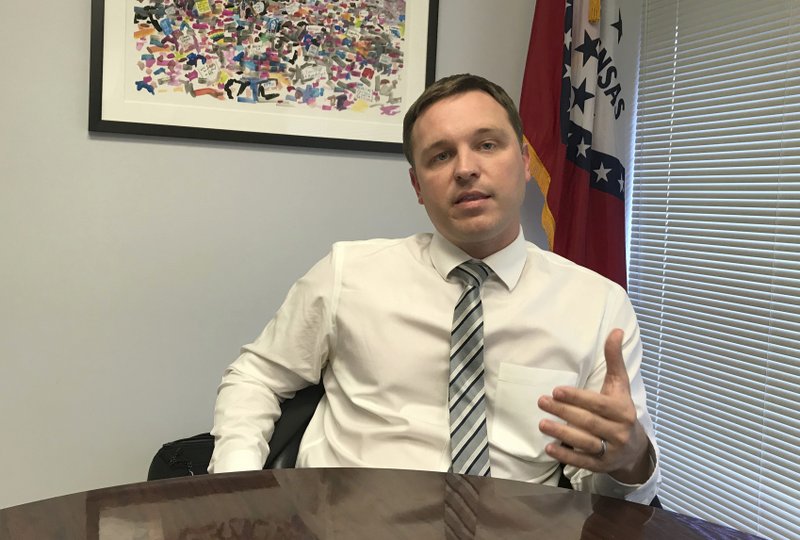Democratic gubernatorial candidate Jared Henderson on Monday said that Arkansas can afford more probation and parole officers, adding that "a longer explanation is certainly warranted" from Gov. Asa Hutchinson over last week's firing of the state's community correction director.
Henderson was referring to the firing of Community Correction Director Sheila Sharp, who oversaw supervision of the state's probationers and parolees. Sharp suggested in a letter that the Board of Corrections fired her for seeking staff increases despite the Republican governor's direction that agency heads not make such requests while his office looks at reorganizing state government and cutting taxes.
In an interview about criminal justice issues with the Arkansas Democrat-Gazette, Henderson also said he is opposed to the death penalty and prison privatization, though he stopped short of saying Arkansas should build a new prison.
"We can afford it and we should look at it," Henderson said of hiring more probation and parole officers. "I would argue that one of the reasons we're seeing the recidivism rates we are is because we don't have adequate resources for our parole and probation officers."
According to the most recent study from the Department of Correction, 56.5 percent of inmates released from prison in 2013 returned within three years.
Recidivism was higher for offenders on supervision, the report found. Meanwhile, caseloads for parole and probation officers are more than double those in other states, another report found.
Henderson said he did not have a specific number for how many officers the state can afford to hire.
Hutchinson campaign spokesman Jamie Barker wrote in an email that "Mr. Henderson has given us yet another glimpse into his lack of knowledge regarding Arkansas's budget & how our state government works."
Barker pointed out that there are current unfilled parole and probation officer positions and that personnel decisions are up to the Board of Corrections.
Hutchinson, 67, oversaw the first executions in more than a decade in Arkansas, while also attracting much out-of-state attention for the rapid pace of executions he scheduled. Hutchinson commuted the death sentence of one man, Jason McGehee, to life in prison.
"When I was younger, I used to support the death penalty," Henderson said. "I don't anymore."
New technologies exonerating death row inmates and the punishment's disproportionate use on members of minority groups led to that change in belief, said Henderson, 39.
"Until the day when Arkansas and America can address those shortcomings, life in prison without parole is enough to keep us safe," he said.
His response on the death penalty differed from one he gave shortly after announcing his candidacy last year.
"I do support it in limited circumstances," Henderson said on Talk Business and Politics in December.
A spokesman for Henderson's campaign, Abby Anderson, said later Monday that the candidate's views on the issue had not changed and that, "as a matter of policy, he doesn't support [the death penalty]."
Hutchinson, in his first term, stood by his prisons director during a spate of violence at several high-security lockups. The governor also signed legislation granting more "strikes" to low-level parole and probation violators to keep them out of prison, and he dedicated funds toward the construction of four mental-health crisis centers. Both of those actions grew out of a list of recommendations from the Council of State Governments Justice Center in 2016.
The Justice Center, which consulted with a state task force on criminal justice, also recommended hiring 100 additional probation and parole officers. Meanwhile, state prison officials have said they're in need of another prison to ease crowding in the growing prison system.
Neither proposal has received funding, while lawmakers also have balked at smaller agency requests for more officers or bed space.
Henderson said he isn't ready to call for the building of a new prison. Revising the state's sentencing grid to keep more nonviolent offenders out of prison and limiting parole and probation revocations could, along with investments in education, eliminate the need for such a project, he said.
Arkansas' prison population is expected to surpass 20,000 in the next decade, beyond its current capacity of 14,540. On Monday, the system housed more than 1,000 prisoners over capacity.
"If we find ourselves in a few more years where we still have these excessive rates of incarceration, we may have to make investments," Henderson said. "It would be sad if those dollars went to [a prison] instead of education or infrastructure."
Henderson said he also opposes the use of privately operated prisons to hold state inmates. The state currently contracts with one private lockup to hold Arkansas inmates in Texas, while local officials in southeast Arkansas are in talks with companies about operating a regional jail that would hold both state and local prisoners.
The governor's office has supported the idea, as has the Board of Corrections.
Metro on 07/24/2018

